As we make our way along our path of self-realization, these words can act like a spiritual bulldozer for each obstruction we encounter in our psyche. For at some point, we will come to a crossroads. What we are now facing is a very old inner landscape that is littered with our fears: fear of death, fear of life, fear of pleasure, fear of feelings, fear of giving up control, fear of being real, and the like. It’s already taken some genuine fortitude to come this far and see that this is what we’ve been covering up. Such fears have been hiding all along in the darkness of our psyche.
To our surprise and dismay, this is where we’re at. And now that we’re more aware of our many fears, we automatically start to feel the effect they are having on our life: What they make us do and how they make us pull back from life. No wonder we have this vague feeling we’re missing out on life. We are. We literally fear the creative process of living and therefore we miss out on it.
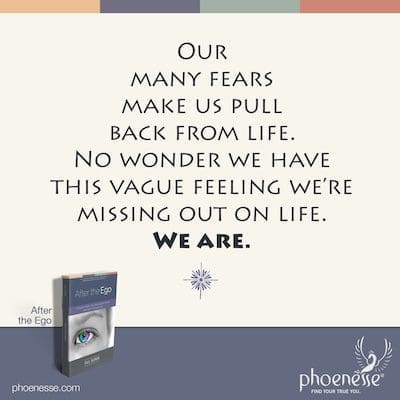
It’s time we find the common denominator behind all our fears so we can start unwinding the unnecessary cycles of fear, frustration and pain. If we have embarked on a path of self-discovery but haven’t yet found our fears, don’t worry, it will happen. It must. Then, when we see how we’ve been hiding from life because of our fears, we can apply these words retroactively to smooth the way. Let them plant a seed now that will bear fruit when the whole of your being is ready to see and resolve the problems in your life. And make no mistake, coping with our fears is the main problem we all face in life.
The nature of all our fears is that we misunderstand the function of our ego and how it relates to our Real Self. The problem we face in sorting out this relationship is that it’s extremely subtle and therefore hard to put into words. What’s more, as with all truths in life, it’s chock full of apparent contradictions. That is, at least as long as we are steeped in duality. Once we get over the hump of thinking and living in a dualistic way, then two opposites can become equally true. And as we’ll see, this applies to the ego and its relationship to the Real Self.
For example, it’s true to say that the ego’s exaggerated strength is the biggest hurdle to living a productive life. It’s also true to say that a weak ego can’t possibly create a healthy life. These are not opposites, people. They are both true.
Before going on, it’s important we stress that humanity’s plight of being unhappy is primarily due to our ignorance about our Real Self. Knowing it exists, as many of the more enlightened people do, is not the same as experiencing it—as living from there. If we had been educated to realize that the goal in life is to reach the place deep within—that this is infinitely better than the ego—we might explore and experiment and seek communication with our core. And voilà, we would reach our Real Self.
But alas, this is not the case. Instead, we go through life becoming more and more limited in our understandings and our goals. We ignore the idea that there is more to us than our ego. And even when we do manage to acknowledge that such a thing exists, we forget during ninety-five percent of our daily lives that this being lives and moves in us, and we live and move in it. We completely forget it exists!
In our ignorance, we fail to reach out for its wisdom. Instead, we stake our whole lives on our limited outer ego, never opening to the truths and feelings of our deeper selves. We blithely go about living as though there’s nothing but the conscious mind of our ego-self, with its pushy self-will and immediately available thoughts. With such an attitude, we unwittingly shortchange ourselves by a lot.
In this land of cause and effect, there are several consequences for our forgetfulness. First, there’s a question of identification. When we only identify with our ego—or outer conscious personality—we become off-balance and our lives lack meaning. Since our ego can’t come anywhere near the resourcefulness of our Real Self, it’s inevitable that we will feel frightened and insecure. And that describes the majority of human beings.
If we’re only living from our ego, life will feel flat and uninspiring. So then where do we frantically turn? To substitute pleasures. But these are hollow, so they leave us exhausted and unsatisfied. The ego simply can’t add flavor or deep feelings to life. Nor can it come up with anything profound, creative or wise. So then what can the ego do? It can only learn, collect and memorize other people’s creative knowledge. Oh, and it can also copy and repeat. It’s also good at remembering, sorting, selecting and making up its mind to go in a certain direction, such as inward or outward.
These are the functions of the ego. But feelings are not a function of the ego. It’s also not the ego’s function to experience deeply or know deeply, which is what it takes to be creative. Here, the word “creative” encapsulates more than just art. For when we are activated by our Real Self, every simple act involved in living can be creative. When we’re cut off from our Real Self, on the other hand, every act will be uncreative, no matter how much effort we make.
In truth, acting from the Real Self is effortless. Wherever it shows up, effort is part of the equation, but it’s always effortless effort. If that seems like a contradiction, well, it’s not.
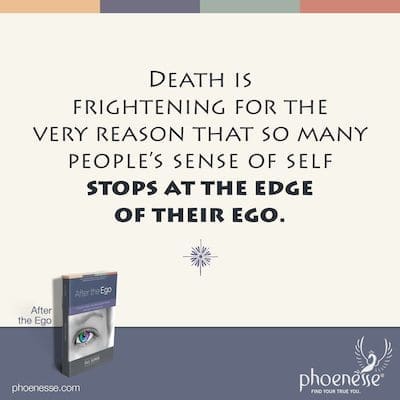
Fear of death
Let’s come back to those fears we mentioned. As we said, they come into being when we remain ignorant, living with false ideas and staying separated from our Real Self. Let’s look more closely at the fear of death, since this casts such a pall over everyone’s life. If we mostly identify with our ego, our fear of death makes sense. After all, the ego does indeed die. If we haven’t yet experienced the truth of our inner being, just making this statement might strike a chord of fear in us.
It’s frightening for the very reason that so many people’s sense of self stops at the edge of their ego. Yet, for anyone who has activated their Real Self and made it a daily reality, they are no longer afraid of death. Such a person feels and knows their immortal nature. We become filled with a reality that can only be one long continuum. That is, after all, the inherent nature of the Real Self. The limited logic of the ego is not able to explain or even comprehend this.
What happens when we give the ego an undue importance in our sense of being alive? It gets scared and sets up a vicious circle. For if we can’t conceive of a reality beyond our limited ego, hearing that our ego-faculties might end will frighten us. It’s only when we’ve experienced the stark reality of the Real Self that we realize how insufficient the ego is. Then we’ll know perfectly well that the ego is inferior and fleeting, and we’ll be fine with that. Fear of death, then, must only exist when our sense of self is attached exclusively to our ego-self.
At this stage we may not yet be able to experience the truth of our Real Self. And while intellectual understanding is a good start, just knowing of its existence won’t do a thing to alleviate our fear. We must go further if we hope to do away with our fear of death. We will need to actualize the Real Self, and this requires passing through certain stages of personal self-development. Lip service will not get the job done.
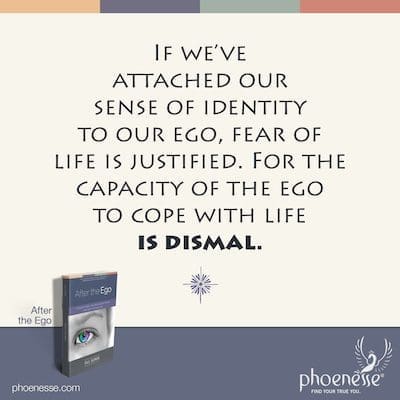
Fear of life
The next fear to talk about is fear of life. It’s an inescapable truth that fear of death and fear of life are flip sides of the same coin. So whoever fears death must also fear life, and whoever fears life must fear death. It’s only the experience of the Real Self that can reconcile these two apparent opposites. Then we’ll be able to see that life and death are just the sunny and shadow sides of our particular form of consciousness. Nothing more and nothing less.
If we’ve attached our sense of identity to our ego, fear of life is justified. For the capacity of the ego to cope with life is dismal. In fact, the ego is downright insufficient in the area of living a productive life. It leaves us feeling uncertain, insecure and highly inadequate. The Real Self, on the other hand, always has answers. This universal self is a solution-making machine, no matter the problem we are facing. Any old experience then, regardless of how futile it may seem at first, can become a meaningful stepping stone that leads to expansion. The Real Self builds on our inherent potentials, making us feel more alive, deeply fulfilled and steadily stronger.
These are things that no one can say about the ego. The ego gets easily tripped up in apparently unsolvable problems and conflicts. It’s totally adapted to the level of duality, where everything is this versus that, right versus wrong, black versus white, good versus bad. And this is a really bad way to approach most of life’s troubles. Apart from the fact that truth cannot be found by looking at one side as black and the other as white, it leaves out a lot of other considerations.
The ego is stuck at the level of duality and can go no further. So the ego is not capable of bringing into harmony the truth that lives on both ends of any opposite. As such, the ego is horrible at finding solutions, making it feel perpetually trapped and anxious. All in all, identifying only with the ego will automatically create a pile of fear in our wake.
Fear of pleasure
Now let’s turn to fear of pleasure. If we’re just starting out and still taking small steps on our spiritual path, this phrase “fear of pleasure” is going to sound absolutely incredible, the same way “fear of happiness” sounds nuts. At this point, you’re likely to say, “Well, thankfully this doesn’t apply to me.” But here’s the real situation: To whatever degree we feel unhappy, unfulfilled or empty, we must fear happiness, fulfillment and pleasure. No matter how much we yearn for these things with our conscious mind, if we don’t have them, somewhere hidden in our unconscious, we fear them. It can’t be otherwise. This equation always comes out even.
Our lives, in fact, demonstrate that we harbor causes we ourselves have set into motion. Our lives are never a product of circumstances beyond our control. What we experience comes from our own inner consciousness. The more self-discoveries we make along our spiritual path, the more we’ll experience the truth of this for ourselves: We create whatever is amiss. It’s important we never lose sight of this truth.
Now then, if we are human, we have fear of pleasure, happiness and fulfillment. This one applies to everyone. Step one is to become consciously aware that we even have this fear. Once we do so, it won’t seem like such a puzzle that our life isn’t landing us the goodies the way we want it to.
The more the ego cramps up trying to attain what it consciously wants—having forgotten that it alone can’t attain the good stuff—the less fulfillment is possible. It’s not so much that the ego obstructs happiness, but rather that it is blindly driven to act the way the fearful, unconscious part tells it to. In a sense, the ego is just being an obedient agent, but it’s following destructive drives coming from our unconscious self that aren’t aligned with truth. When faced with unfulfillment, instead of working to realign our erroneous, hidden parts with the truth, we spend our time rationalizing our unproductive behavior.
The work of giving up our ego—from the perspective of the ego—is going to seem terribly frightening. And right here, on this edge, is where so many get caught. From the ego’s vantage point, this is an unsolvable puzzle, and it will continue to create the following conflict as long as we remain stuck here: Our lives can only unfold with delight, pleasure and creativity when we’re no longer solely identified with our ego. And so, we must activate the Real Self.
To do this, we will need to let go of direct ego controls. The inner movements of our Real Self will not surrender to our ego and its outer thoughts and will. It doesn’t matter how hard we try. We must find the courage and trust to surrender to the inner movement.
Think back to a heightened moment in life that felt pleasurable, inspired, effortless, creative. Such an experience was deeply joyful precisely because we had been willing to let go. For a time, we were animated by something other than our ego. Happiness is the natural byproduct in such a moment. We can’t be our Real Self without being happy. And we can’t be happy unless we connect with our Real Self and let it enliven us. Such happiness is free from fear that the good times must end. It stimulates and excites us, making us feel vibrantly alive and peaceful.
The concepts of peace and excitement are then no longer split, as happens with the duality-draped ego. From the stance of the ego, peacefulness excludes excitement, making it boring. Excitement excludes peace, creating tension and anxiety. To live from our Real Self is to be free from such unnecessary choices.
And so here we are, trapped in this dilemma: How can I fearlessly embrace a state that asks me to let go of my ego faculties, when my ego is all I know? We must start to see our fear of happiness in this light. Otherwise, we will not find our way out of this trap. Until we do, we will waffle between terror at letting go and hopelessness. We will feel haunted by this feeling that we’re missing out on life, lacking something essential. And for as long as we cling to our ego, this will be true. We will miss out on the very essence of who we are.
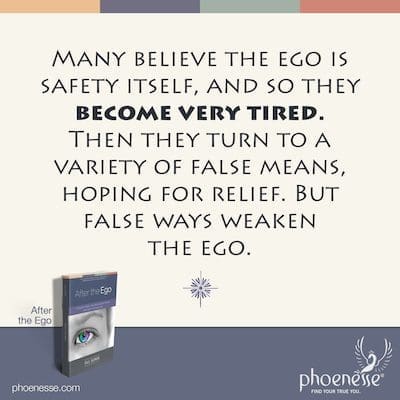
Fear of letting go
Now we’ve come to the fear of letting go. As we’ve said many times, if we derive our sense of self exclusively from our ego, letting go will look a lot like annihilation. But once we’ve made some inroads, here and there, little by little, we’ll soon see that letting go doesn’t bring danger. It brings life itself.
Slowly, we will adjust to the new vibrations. For there’s no conflict between being in a body and living with these new conditions. None at all. The ego is perfectly capable of interacting harmoniously with the Real Self. Plus, the ego still has its functions, as well as its limitations and its own power.
We’ll return to this in a moment. First, let’s note that when we fear our Real Self, we’re not only going to fear life, death, pleasure and a whole host of other things, we’re going to fear our feelings. Second, it’s clear that feelings cannot be controlled by the ego. If we think it’s the other way around, we are deceiving ourselves. Trying to do so kills the freedom and spontaneity of our Real Self.
Feelings don’t respond to orders, either from our ego or from someone else. Rather, they have a life of their own, coming about indirectly and independently. They follow their own laws, their own logic, and their own wisdom. We will be much further ahead if we work to understand how they operate than to deny them or superimpose the puny laws and logic of our ego on them.
Feelings are an expression of the creative process emanating from our Real Self. And we can’t force this process. That said, we can encourage or discourage feelings in the same way we can encourage or discourage the creative process. They are both inner movements, which we can also call soul movements, that give us messages we would do well to heed. Such signs point us toward self-realization and help us establish contact with our Real Self.
Our Real Self exudes a vital flow of energy that consists of a variety of different streams. We call this a transmission of life force. It’s a tremendous power as well as a consciousness. It contains deep wisdom and follows eternal, immutable spiritual laws. Exploring and understanding these laws can enrich our lives immeasurably.
To deny the intense ecstasy of this life force—which manifests on all levels of existence, in some areas more intensely than others—is to court death in various degrees. To embrace this life force is to live deathlessly. So denying the pleasure of life is death.
Death came into existence because the ego came into existence. The ego, then, is a split off particle of the greater consciousness that remains in all human beings. Unless we integrate the split-off part—the ego—with its origin, it dies. So splitting off and death go hand-in-hand. In the same way, reconnecting and living are tied together. So ego existence, death and living without pleasure are intimately linked, as are life, pleasure supreme and the Real Self.
Therefore, whoever fears letting go of the ego—who also fears and denies pleasure—is dancing with death. This is actually the true meaning of death: to deny the original, true kernel of life. It’s not hard to see why so many spiritual teachings have jumped to the erroneous conclusion that the ego must be done away with. As a result, many people are in confusion about the ego and what to do with it. Neglect it? Discard it? Crush it? Nothing could be further from the truth. Doing so only sends us over to the opposite extreme, and extremes are always damaging, wrong and dangerous.
Lifetime after lifetime, people have overemphasized the ego, mistakenly believing that this is the only safety net there is. Many believe the ego is safety itself, and so they become very tired. For soul movements based on error are exhausting. People also cramp up in an effort to desperately hang on. Then they turn to a variety of false means, hoping for relief. But false ways weaken the ego.
If, on one hand, the ego is too strong, it will always be weak on the other hand. This is really a very practical teaching to work with: To whatever extent we’re afraid to let go of our ego control—because we think letting go will cause us to lose strength—to that extent we’ll be afraid to assert ourselves. To whatever extent we are able to surrender—to our feelings, the creative process, the unknown aspects of life, to our partner—the stronger we must become.
When we let go, we won’t be afraid of making mistakes, making decisions or meeting difficulties. We will be able to rely on our own resources, and we will be willing to pay the price to have self-autonomy. Plus we will have the integrity of our own perspectives and be able to assert our rights, as we meet our obligations freely and willingly. We will no longer act because we fear authority or because we fear the consequences of someone not approving of us.
When we have a strong, healthy ego and can assert ourselves like this, then self-surrender will be possible. But if we have such a weak ego that we fear self-responsibility, both self-surrender and pleasure will be impossible. If we are someone who habitually overworks and exhausts our ego faculties, then we are a good candidate for finding a false solution. While such escapes may take many forms, one of the more crass forms is insanity, where the ego loses all ability to function.
In less crass forms, we develop neurotic tendencies that prevent us from taking self-responsibility. For others, drugs and alcohol are the artificial means used to get relief from an overly tense ego that’s deprived of pleasure and too frightened to surrender to the Real Self.
The work of the ego
It’s important we comprehend what the ego can and cannot do. We need to know its limits. Most importantly, we need to realize this: the ego is only a servant to the greater being inside. Its primary function is to intentionally seek contact with our greater self. The ego needs to know its place. Its strength lies in deciding to make contact and ask for help from our Higher Self. The goal is for the ego to establish permanent contact.
In addition, the ego has the task of discovering any obstructions that lie between it and the greater self. Here too, the task is limited. Self-realization always arises from within, from the Real Self, but it comes in response to the ego’s wish to uncover errors and destructiveness, and restore falseness to its truthful nature. In other words, the ego has a job to do in the process of self-development: formulate our thoughts, intentions, desires and decisions. But there’s a limit to how far it can go.
After the ego has decided for truthfulness, integrity and honesty, making an effort and working with good will, it needs to step aside and allow the Real Self to come forward. This universal life force will bring forward intuition and inspiration to guide a person on their path. But the ego’s job is not one-and-done. Over and over, the ego must select, decide and intend, if we want to stay true to our path of personal self-development.
The ego is capable of learning, so it must become willing to learn from within, understanding the deeper language of the unconscious. At first, everything may seem garbled and obscure. As we go along, things will become more and more obvious. Our ego needs to learn how to interpret the destructive messages that come from our unconscious and tell them apart from the messages emanating from the still deeper unconscious Real Self. For this is where wonderful creativity and constructiveness bubble forth from.
To do our inner work, the ego must bring focused effort, a good attitude, and pay wholehearted attention. It must know its limits regarding deep wisdom, and tune into the rhythm and timing of the work. It must gather strength for persevering when the going gets hard, and yet be willing to call on the unlimited resources of the Real Self.
Over time, the ego must develop the finesse to sense when it should be more alert and when it should back off so the Real Self can shine through. It must learn to roll with the subtle interplay between being strong and assertive—to overcome resistance, and ferret out excuses and rationalizations—and stepping aside to listen and learn. The ego, then, is like hands that move toward the source of life, and then, when their function is to receive, open and stop moving.
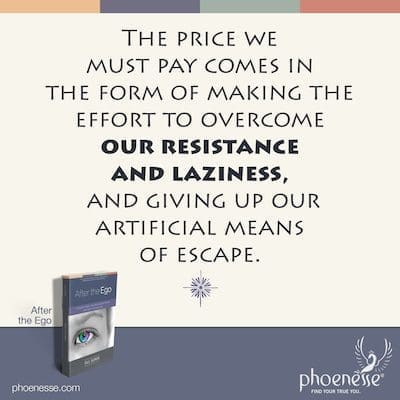
Paying the price
These teachings are rich and powerful. It’s worth taking the time to study them deeply, sentence by sentence, and meditate on them. We should consider how to make use of this material, not just by understanding it theoretically, but by also seeking out that part of ourselves that is eternal.
To know this wonderful, truly adequate part of ourselves is our birthright. And given how valuable such connection is, it makes sense that it won’t come easy or cheap. The price we must pay comes in the form of making the effort to overcome our resistance and laziness, and giving up our artificial means of escape.
The other thing we must do is explore the conditions that make it possible to connect with our Real Self. In short, our ego must become compatible with our Real Self. We’ll need to have the courage to find our own truth, for the Real Self is not beholden to outer laws of morality. We must find our own inner compass rather than simply give our allegiance to public opinion, society or an outer authority.
The ego then is not being asked to submit, for submission happens from a cowardly place of fear and greed. And we’re also not condemning outer morality. We are only saying that outer morality is not the driver for true inner morality. The Real Self holds exacting standards of real morality that are of a far deeper nature.
We must look for where we are selfish and cruel, self-centered, greedy and dishonest. Even if there is only a small particle in our soul, we must discover it. For every such particle, no matter how we dilute it using kindness or genuine goodness, stands in our way—especially when we attempt to sweep it under a rug.
If we cheat ourselves by trying to cheat life in any way, we are making ourselves incompatible with our Real Self. So our work must be to find where and how we cheat. These areas may be well hidden, but if we are unhappy in any way, they exist. And they are separating us from our Real Self.
“Be in peace, be blessed, be in God!
–The Pathwork Guide

Next Chapter
Return to After the Ego Contents
Read Original Pathwork Lecture #158: The Ego’s Cooperation With or Obstruction of the Real Self

